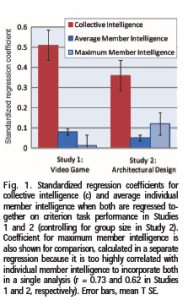It isn’t often that I indulge in a diversion into academic papers rather than books, but this one is an exception, and it isn’t even an economics paper: “Evidence for a Collective Intelligence Factor in the Performance of Human Groups” (pdf). The five authors present the results of experimental evidence on the performance of small groups of people, randomly assigned, in carrying out a range of tasks such as visual puzzles, brainstorming, negotiations.
To the surprise of the psychologists, the success of the groups bore little relation to either the average intelligence (measured by standard tests) of their individual members, nor to that of the most intelligent individual in each group. Instead, successful outcomes were best explained by a collective intelligence factor, which seems to be positively related to the social sensitivity of the group’s members (also measured by standard ‘looking in the eyes’ tests), and to both the proportion of women in the group and the extent to which group members all participated in conversation (which must be related to the female quotient).

Collective intelligence dominates individual intelligence
To which cynical female readers will respond, tell me something I don’t know. But if taken seriously, such findings have profound implications for institution-building in a society where so many important groups from company boards to union executives to the Cabinet are assemblages of alpha males. Ours is also a society where the focus on individual achievement has gone too far, as manifested in obscene ‘performance pay’ and bonuses for people whose apparent success actually depends more on the team around them than on their individual merit. For example, Boris Groysberg’s book [amazon_link id=”0691127204″ target=”_blank” ]Chasing Stars[/amazon_link] demonstrated convincingly for Wall Street ‘star’ analysts that in fact the institution, not the individual’s talent, explained successful results, as when these ‘stars’ are poached, the success stays with the bank they have left.
[amazon_image id=”0691127204″ link=”true” target=”_blank” size=”medium” ]Chasing Stars: The Myth of Talent and the Portability of Performance: The Myth of Talent and the Portability of Performace[/amazon_image]
Coincidentally, I’m part way through [amazon_link id=”B005LVN17C” target=”_blank” ]I’ll Have What She’s Having: Mapping Social Behavior[/amazon_link] by Alex Bentley, Mark Earls and Michael J O’Brien. The title refers to the famous fake orgasm scene in When Harry Met Sally, and the importance of imitation as a success strategy in life and business. The book’s theme also is the importance of collective intelligence – other people are where we store all the things we don’t know ourselves. It promises ‘how to’ advice in later chapters; I might report back.
[amazon_image id=”B005LVN17C” link=”true” target=”_blank” size=”medium” ]I’ll Have What She’s Having: Mapping Social Behavior (Simplicity: Design, Technology, Business, Life)[/amazon_image]

The cabinet is alpha males? People like Cameron aren’t alpha males – they were born with a silver spoon. Alpha males are people who have fought their way to the top, surely. I might believe Bob Crowe, Alan Sugar and Alex Ferguson are alpha males, but George Osborne? No way.
Now the key is to replicate the conditions of effective turn taking, social intelligence and “female behaviour” in any group. Done. The Core Protocols and related learning give any team the advantage noted by the study. http://www.mccarthyshow.com